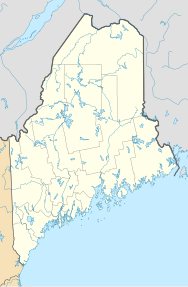Strong, Maine
| Strong, Maine | |
|---|---|
| Town | |
 |
|
| Motto: Toothpick Capital of the World | |
| Location within the state of Maine | |
| Coordinates: 44°48′32″N 70°11′59″W / 44.80889°N 70.19972°W | |
| Country | United States |
| State | Maine |
| County | Franklin |
| Incorporated | 1801 |
| Area | |
| • Total | 28.94 sq mi (74.95 km2) |
| • Land | 28.35 sq mi (73.43 km2) |
| • Water | 0.59 sq mi (1.53 km2) |
| Elevation | 741 ft (226 m) |
| Population (2010) | |
| • Total | 1,213 |
| • Estimate (2012) | 1,208 |
| • Density | 42.8/sq mi (16.5/km2) |
| Time zone | Eastern (EST) (UTC-5) |
| • Summer (DST) | EDT (UTC-4) |
| ZIP code | 04983 |
| Area code(s) | 207 |
| FIPS code | 23-74825 |
| GNIS feature ID | 0582753 |
Strong is a town in Franklin County, Maine, United States. The population was 1,213 at the 2010 census. Strong is home to the annual Sandy River Festival.
The plantation was called Township No. 3, First Range North of Plymouth Claim, West of Kennebec River (or T3 R1 NPC WKR), then successively known as Middletown and Readstown. It was first settled in 1784 by William Read from Nobleboro. Readstown was incorporated on January 31, 1801 and named for Caleb Strong, governor of Massachusetts. The Maine Republican Party was founded here on August 7, 1854.
Set on a hilly intervale above a big bend in the Sandy River, the area provided fertile soil for agriculture. Farmers grew hay, wheat, corn, oats and potatoes. The northeast branch of the Sandy River provided water power for mills, helping make Strong prosperous. By 1859, when the population was 1,008, it had sawmills, a gristmill, a fulling mill, a carding machine, a starch factory and a tannery.
The narrow gauge Sandy River Railroad connected Farmington and Phillips in 1879. By 1886, town industries included a boot and shoe factory, machine shops, Maine's first cheese factory, a clothespin manufacturer, a maker of cane seat chair bottoms, and an excelsior factory. It was noted as "one of the prettiest villages in the county."
...
Wikipedia

